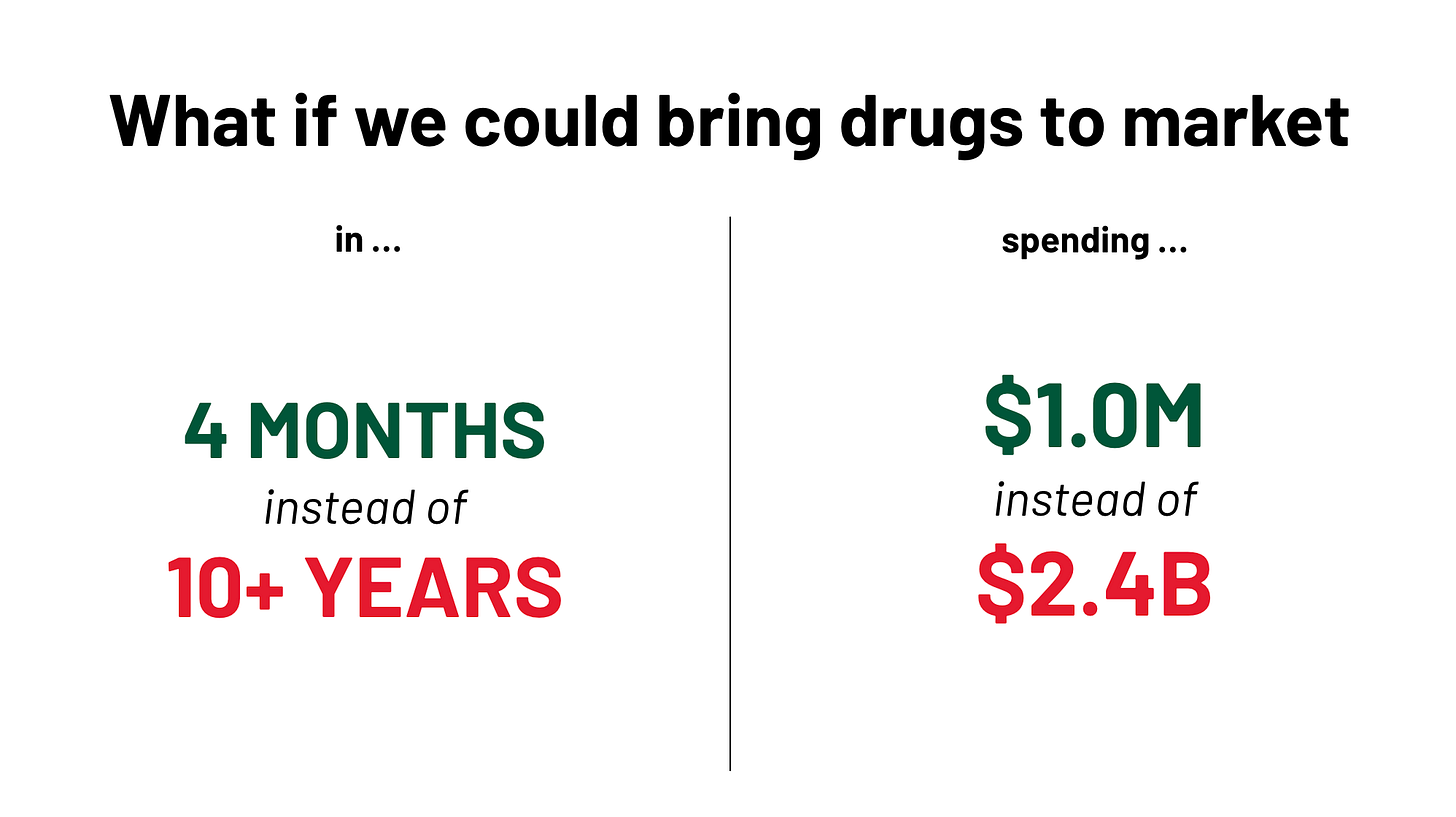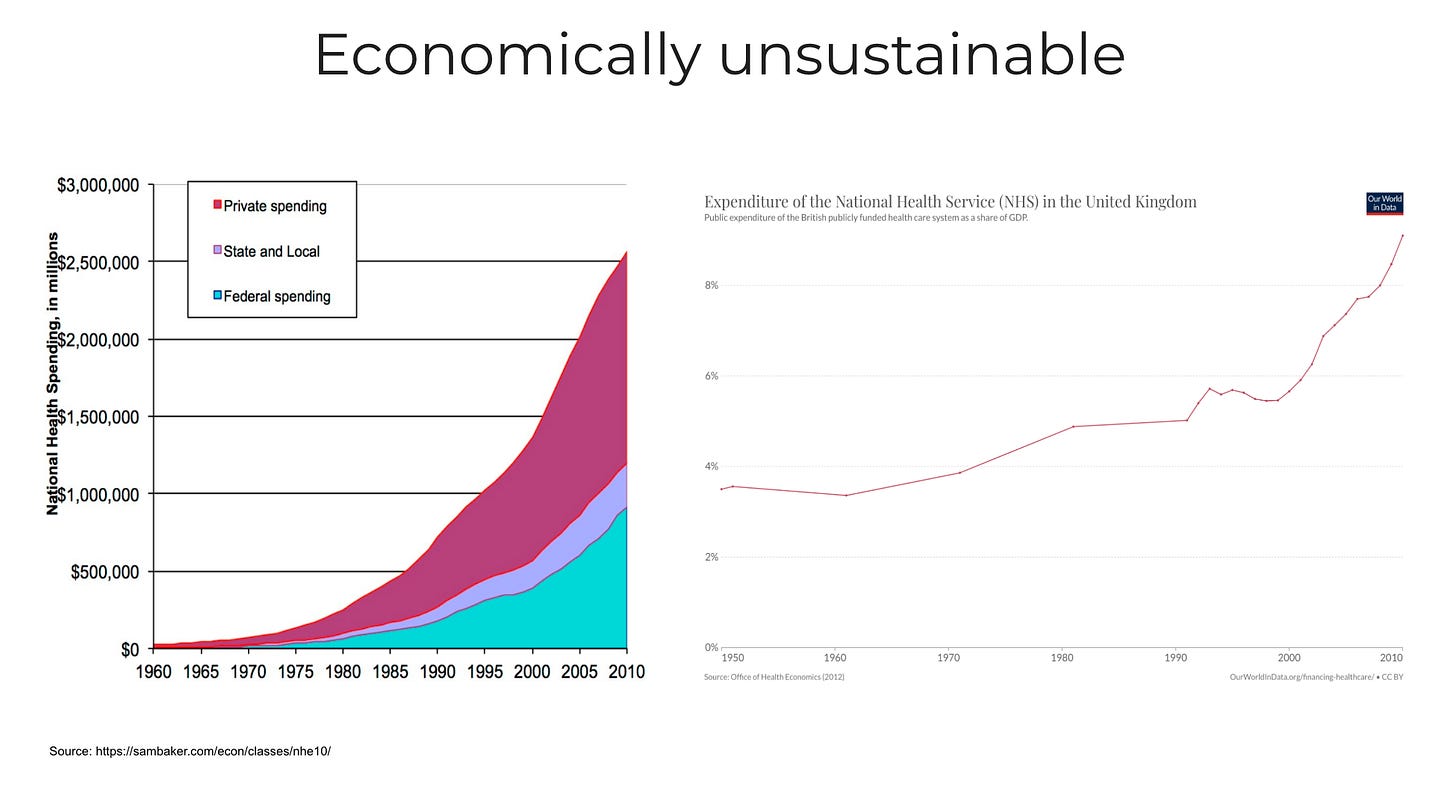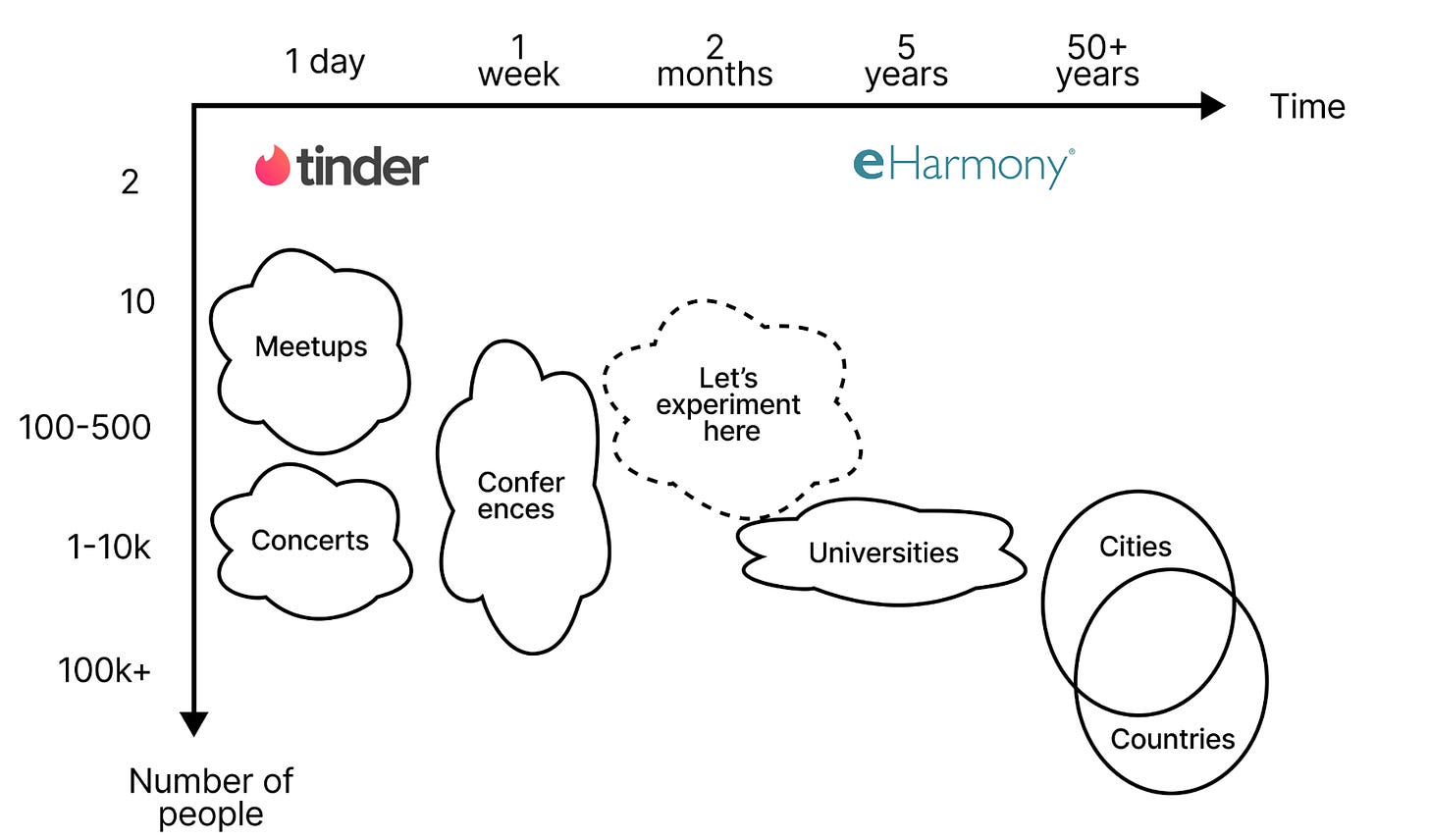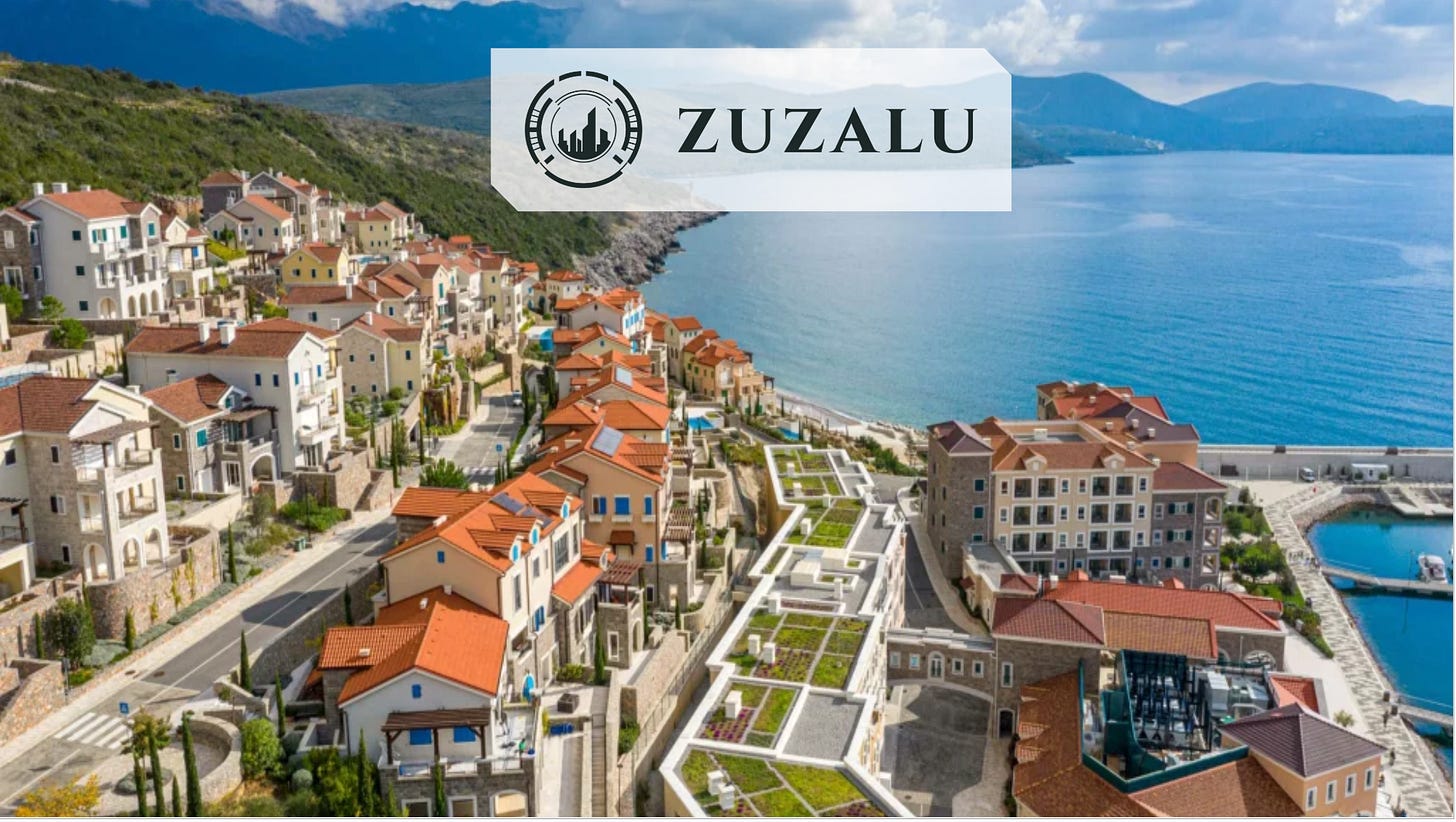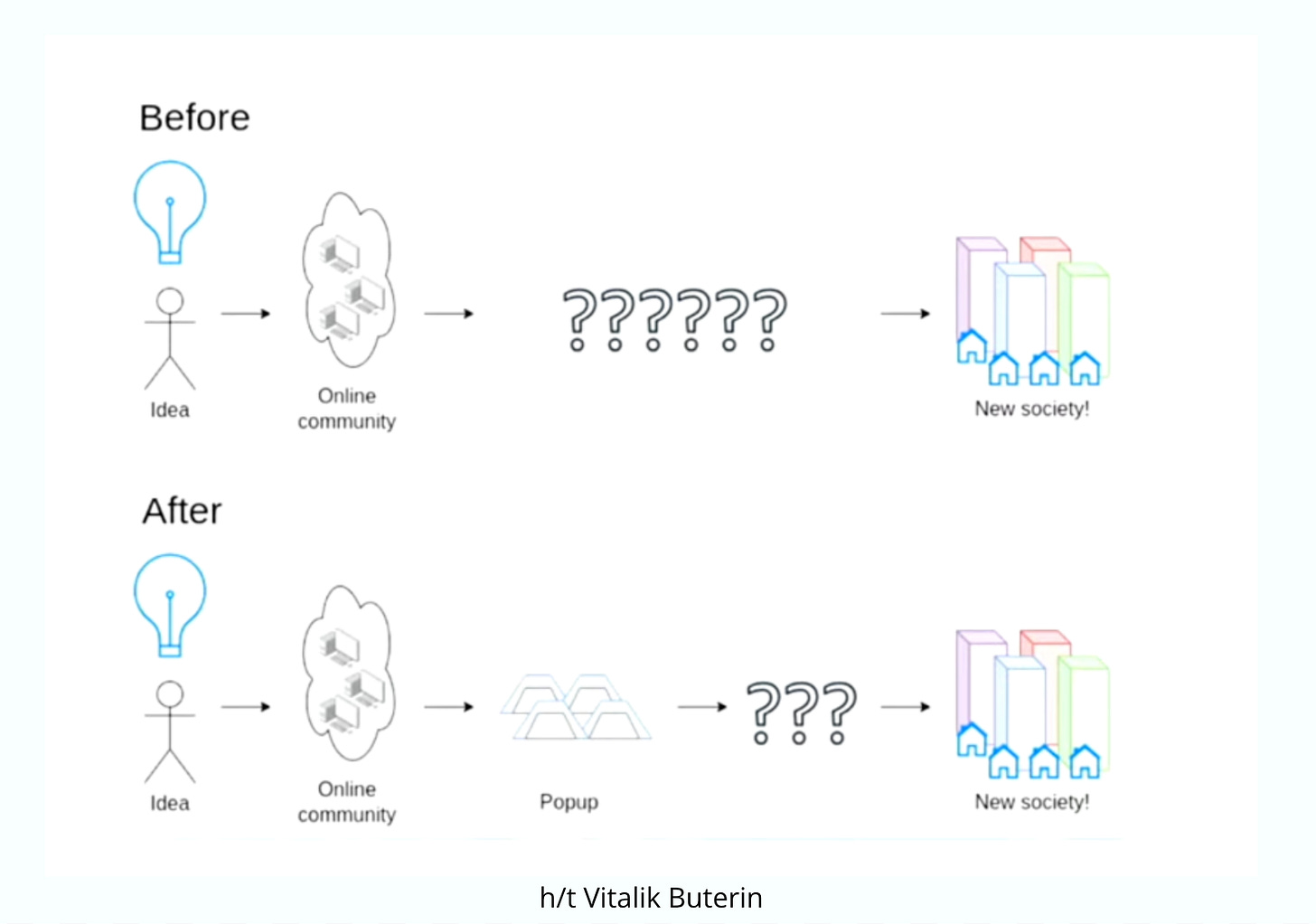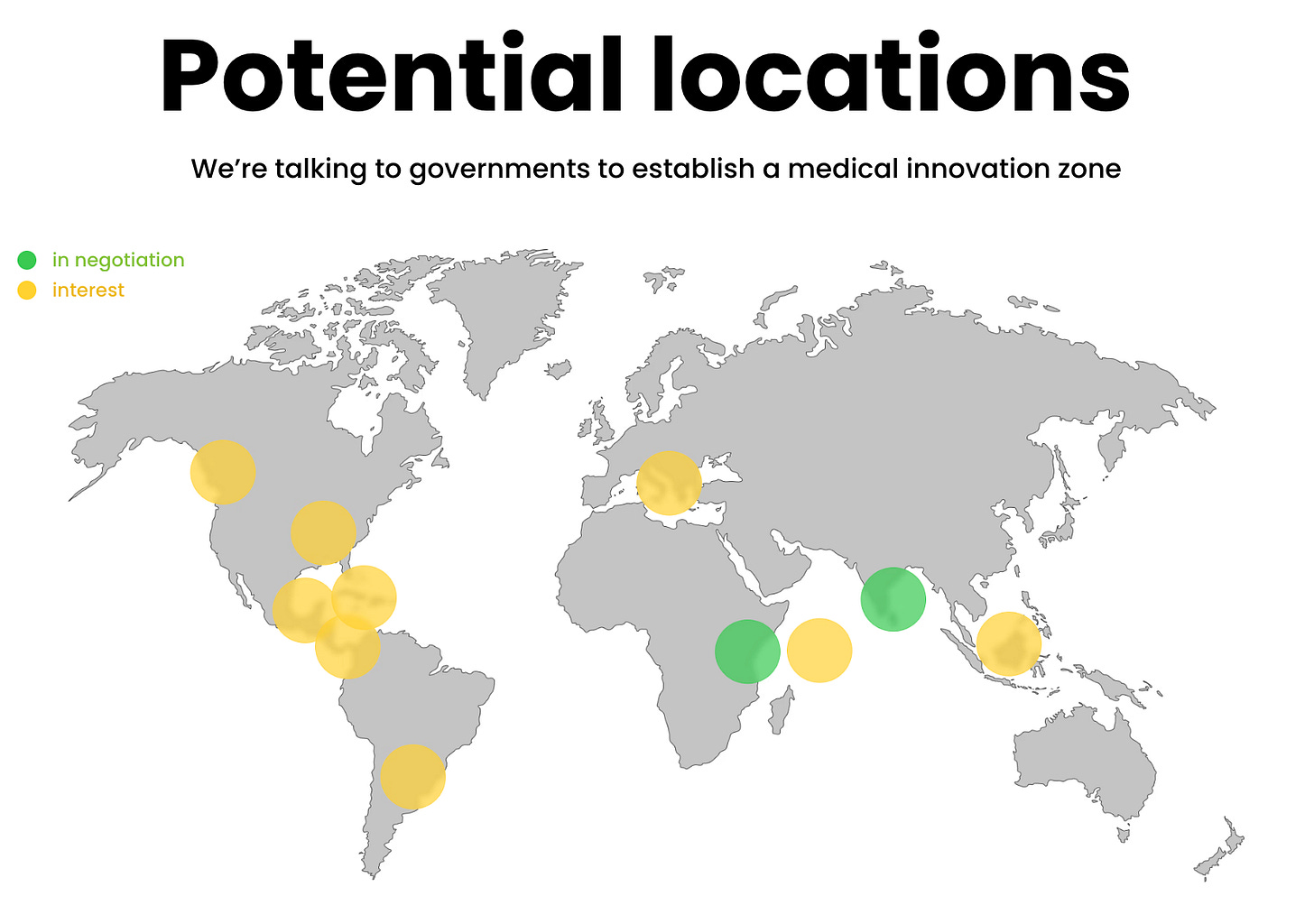The Secret Viva City Manifesto
Building a city to make death optional
Summary
Humans dislike aging & involuntary death, generally. Advancements in science indicate solving these problems is now within our grasp. The question is when, and if we will be the last generations to die.
We are calling a state of emergency, and embark on building a city focused on warp-speed innovation to dramatically accelerate longevity R&D, early therapy access.
Join Viva City and be part of a “moonshot”, a “Los Alamos”-style environment aligned around the idea that life is good and death is bad.
Let’s shrink therapy development timelines, nurture collaboration, and ultimately make death optional.
The Quest for More Life
Humans have long dreamed about a fountain of youth, pouring immense effort into this pursuit. However, it has been wasteful. It has been deemed selfish, driving many to ruin. The disappointing encounters with 'snake oil' solutions, ineffective and deceitful remedies, further marred our hope. Each story we hear teaches us that we shouldn’t pursue longevity.
We eventually surrendered to the horrors of aging & death as unavoidable certainties, recognizing the wisdom in accepting that which we cannot change.
This mindset was not unique to aging. For instance, leading physicists declared “heavier than air flying machines are impossible”. Even after the Wright brothers succeeded, people & media refused to believe it for years.
Similarly, going to the moon was an analogy for something literally impossible. “Yeah you'll do that when men walk on the moon”.
Moonshots
Yet, humans did succeed in these endeavors that were previously thought impossible.
The Manhattan Project involved building a city in Los Alamos, demonstrating coordination at an unprecedented scale and, at its peak, using up to 3% of the USA’s GDP for just one project likely accelerating progress by many years.
Humans have always been battling death, disease, and entropy / disorder. The desire for health is universal, but foreseeing the long-term implications and planning for future needs is a challenge many struggle with. The need for treatments and health interventions may seem distant, but the time to act is now, not when you are already sick and it's too late. The time to invest in our future health is now.
The Denial of Death
The denial of death, as Ernest Becker posits in his seminal work, is a fundamental aspect of human psychology. It's a coping mechanism we employ to deal with the existential dread of our mortality. This denial, however, and the anxieties arising from the awareness of our mortality often act as a barrier, holding us back from fully embracing life and realizing our full potential with compounding effects. It limits our aspirations and confines our dreams within the boundaries of our lifespan.
But what if we could transcend this final frontier? What if we could mitigate the inevitability of aging and death?
Without the shadow of death looming over our existence, we can unleash the boundless potential of humanity.
Let's redefine the boundaries of human life, not dictated by the passage of time, but by the depth of our collective imagination and resolve.
There’s a paradigm shift when viewing aging as a solvable problem. Just as we've overcome other challenges considered impossible, there is potential for a revolutionary change in our approach to aging. The inevitability of aging and death is no longer looming over us, giving way to new hope and possibilities. It's not a question of if we can mitigate the effects of aging, but when. The prospect of living longer, healthier lives may become reality within our lifetime, reshaping how we view and experience life.
Will you be the last generation to die? Can you do something to speed up progress, increasing the likelihood you’ll reach “Longevity Escape Velocity”? (the point where medical advances extend life faster than people age).
Roadblocks
There are significant roadblocks to bring new drugs to market (taking decades and $2-6 billion). Instead of Moore’s law, we got the inverse, Eroom's law (coined by our friend Jack Scannell - see Nature paper).
Drug development has been getting more expensive and time-consuming over time, despite technological advances.
We have a paternalistic, monopolistic, prohibitory regulatory approach that tells us what we can and cannot do with our own bodies. The incentive for regulators is to protect people from drugs that are unsafe and/or ineffective.
But there’s an invisible graveyard of people dying waiting for medicine that is slowed down or prevented because of the red tape.
People just accept the status quo, even if it’s really bad.
110,000 people die from aging every day. One second, one life. 40 million per year. Hundreds of millions suffering in their last years, right now. All avoidable.
Medicine has enabled us to have control over most infectious diseases, but when it comes to chronic diseases (mostly age-related), we are just managing symptoms, keeping people in a poor state of health for longer.
Opportunity
Instead, we can treat the root cause, aging itself.
We are on the brink of being able to bring aging under medical control. We have successfully decoded the human genome, laying bare the blueprint of human life. Control over our biology has been expanding.
We have already seen dramatic results in slowing down or even reversing aging by ~30% in lab animals using dozens of pharmaceutical interventions. This provides compelling evidence that it is possible to influence the aging process.
With the emergence of advanced gene and cell therapies, as well as lipid nanoparticles, we’ve shown we can quickly develop effective treatments when we put our will behind them.
Humanity treated the COVID pandemic like a crisis. “Operation warp speed”. We had a new vaccine in ~ 8 months instead of the 15 years that it usually takes. We could have done it in ~ 4 months if we had allowed challenge trials.
Humanity doesn't see aging as a crisis, even though each age-related disease (such as Alzheimer's, heart disease, cancer, etc) is a bigger problem than COVID.
But we do.
The vision: warp-speed innovation & a post-scarcity world
Viva City is a moonshot to make death optional by coming together in a new city within a special regulatory zone.
A multi-jurisdictional city fostering drug development at warp speed: 4 months to get to market, instead of 10+ years.
The residents coordinate toward freedom from disease and suffering, striving for vitality instead of degeneration & death.
To achieve this we need Special Jurisdictions where we have medical freedom. There are thousands of Special Economic Zones in existence, but most have a few special tax & customs rules.
We need medical freedom to enable self-experimentation and warp-speed drug development in a sandbox, without requiring permission from the broader society. We believe we can show there’s a better paradigm for regulations, a certificatory approach based on first principles, as safe or even safer than the status quo.
Show a better, faster way, save millions of lives that are otherwise dying waiting for a cure, and inspire the rest of the world to incorporate what works.
Life is awesome & precious. Death is a tragedy. Tackling aging should be humanity’s #1 priority. At least in our city, it is. We will inspire others. Countries will watch, learn and incorporate what works.
Instead of the inverted demographic pyramid (we already have more people over 65yo than people under 5yo), which is unsustainable (most young people are in developing countries, while most elderly people are in developed countries - when these young people grow up, they won’t be able to sustain the many more elderly, sick people), we can rejuvenate people, leading to an acceleration in prosperity.
We can flip from potential societal collapse to a post-scarcity future.
Without the burden and constraint of aging and death, our potential is unleashed. We can grow, compound knowledge, dream bigger, think longer term. We don't have to take care of the elderly, they will be healthy, rejuvenated, with vitality. Imagine Einstein or Da Vinci enabled to contribute over a very long, indefinite lifespan, adding exponential value.
Instead of growing GDP at ~2% per year, we invest back the amount we’d have spent on the elderly plus gain from the productivity increase of them and their kids (who don’t have to spend time taking care of their elderly parents), we can grow GDP by 10% to 40% (!). With conquering death, the final frontier, we inspire humanity and give ourselves time for everything else, for unprecedented human flourishing.
Death is not caused only by aging. If an asteroid is heading towards earth we should work on diverting that danger. There are many existential risks, like unaligned AI, bioterrorism, nuclear war, etc. They are all important to tackle, yet aging is 100% going to kill us if we don’t do anything. The others are not 100% certain. We do, however, support initiatives to reduce suffering and death, more broadly.
Why a new city?
New cities have been built before for science to fix a crisis: Los Alamos, with the Manhattan Project.
How to start a new city without centralized, top-down military support and societal consensus recognizing a crisis?
Balaji Srinivasan said “we’re able to start new companies, new currencies, we can start new countries” in The Network State. The playbook involves establishing a community aligned for collective action that crowdfunds territory and gains diplomatic recognition (imagine a DAO like VitaDAO instantiates a physical semi-autonomous location).
The seasteading and charter cities movements have been trying to establish a “clean slate”, but haven’t yet gained significant traction.
There’s still a gap between a regular online community and getting diplomatic recognition.
We think a “state” or country isn’t needed. The community can have some autonomy without full sovereignty. It can have new rules and regulations, medical freedom, and be synergistic with incumbents without being hindered.
We’re envisioning an archipelago, a network of “cities” or “districts”, and people can freely move between them (relocation insurance can ensure that people are empowered to move if the location they’re in is no longer viable; the insurance fund has the incentive to lobby and maximize the stability of that location).
Through modern, futuristic mega-cities in the style of Singapore, Dubai, Hong Kong, we’re creating the new frontier for innovation and effectively coordinating a highly aligned community to make death optional.
The first steps
To get our feet in the water when it comes to meeting in person, the first step was dinner parties and meetups. One step further, which requires bigger buy-in, it’s conferences and coliving spaces. Then, we went one order of magnitude farther in both number of people and duration, with a 2-month, 200-people pop-up city: Zuzalu, in Montenegro, co-organized with Vitalik Buterin, welcoming people such as Jaan Tallin, Joe Lonsdale, Jean Hebert, Grimes, Joe Betts-Lacroix, Adam Gries, Nathan Cheng, etc.
We had healthy food available, healthy habits, exercising, sauna, cold plunge, self-experimenting and tracking our biomarkers. Living healthy and collaborating was easier, giving a taste of what it’d be like to live in such a city, demonstrating the potential of the vision on a smaller scale.
At the same time, Montenegro got a sneak peek of how great it’d be for them to attract world-class talent, innovation and potential investment into their country, ending up with the intent to establish Special Economic Zones, to foster an environment where experimental treatments can move from concept to reality at unprecedented speeds.
We then took this further with Vitalia, a pop-up city on Roatan, with a special regulatory zone, welcoming people such as Naval Ravikant, Bryan Johnson, Aubrey de Grey, Brian Armstrong, Balaji Srinivasan, Chris Williamson, Tim Draper, Patri Friedman, Robin Hanson, Dave McClure, etc.
While looking for a new location, we started seeding “embassies” (hubs for our community) in major cities, like zelar.city in Berlin, welcoming people such as George Church, Andreia Maier, Oliver Zolman, Alex Zhavoronkov, etc.
It’s important that we gather in person in existing cities as well, meeting people where they are, to get a taste of what it’d be like, before travelling a long distance, upending their lives, relocating to the new city location.
New regulatory sandbox
We need a new regulatory sandbox, a medical innovation zone, where we can develop life-saving medicine at “warp-speed”. We’re in negotiation with governments in multiple continents. We aim to have a new location within 9 months.
Our pitch to governments:
Foreign Direct Investment, from the development of the real estate and the companies that would set up there (on the order of billions of dollars)
Jobs (10 - 100k+)
Share in the upside with locals (including direct dividends)
Reversing brain drain
Governed by the residents
Improving the health of the locals
A tier 1 hospital - ER and clinic subsidized by the trials, possibly with a niche focus on terminal patients, with a pay-for-success model
Access to the therapies, at cost
To increase chances of success and move faster, we want to partner with other charter city builders, like Praxis, Braavos / Charter Cities Institute, Tipolis / Free Cities Foundation, Alpha City / Pronomos etc, especially on the real estate side (as well as traditional city developers, like Rendeavor) and operating the city (governance services).
If you are a government representative open to creating a regulatory sandbox in your country, get in touch.
Funding
While preparing to build the city, we are growing our community and global presence.
If you would like a scholarship to come meet us in person at upcoming gatherings, apply here.
If you would like to create a clubhouse for people to gather, eat healthy, exercise, co-work, and co-live, in your city, apply for funding here.
If you would like to start a longevity biotech company, apply for funding from VitaDAO.
In short, the secret master plan is:
Build a community online
Gather some of them in person in meetups and “pop-up cities”
Gather some of them as permanent members in global clubhouses
Gather some of them as residents in the special jurisdiction
While doing the above, also fund companies


